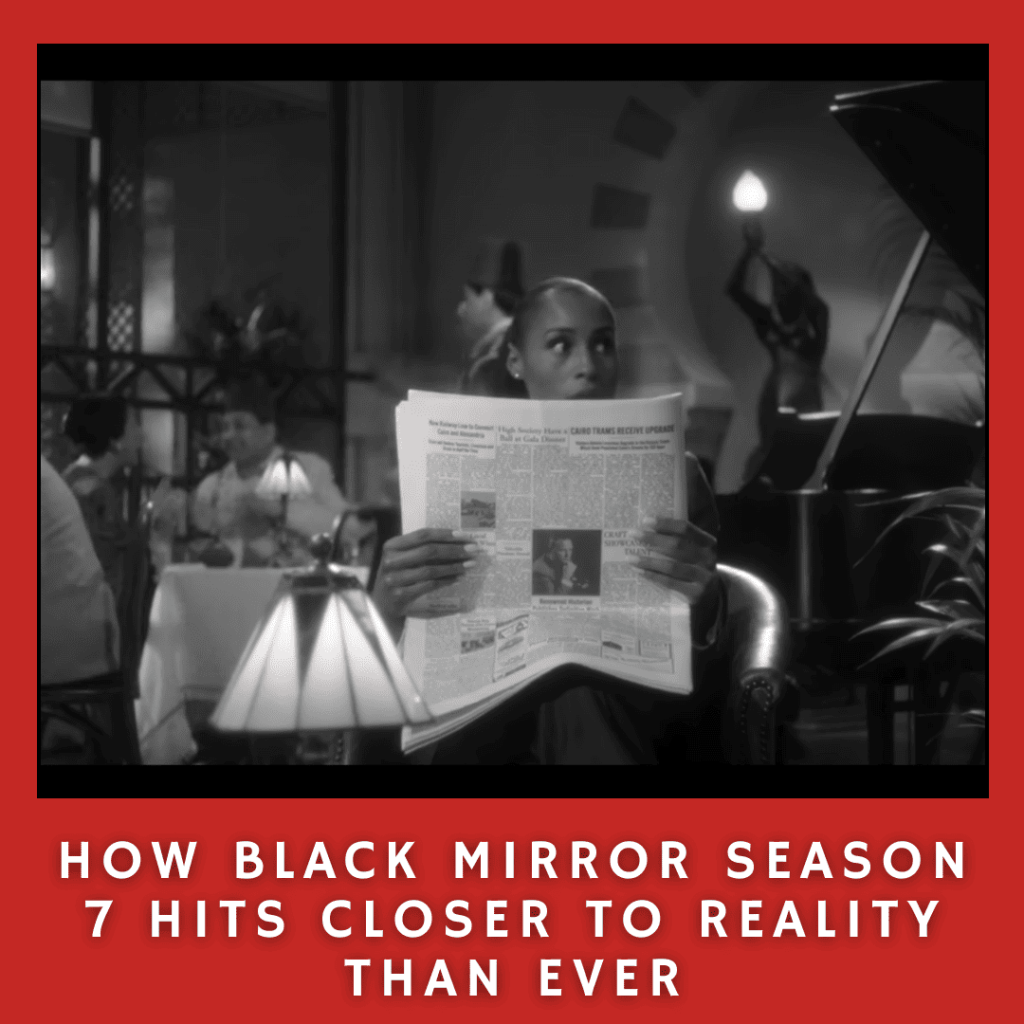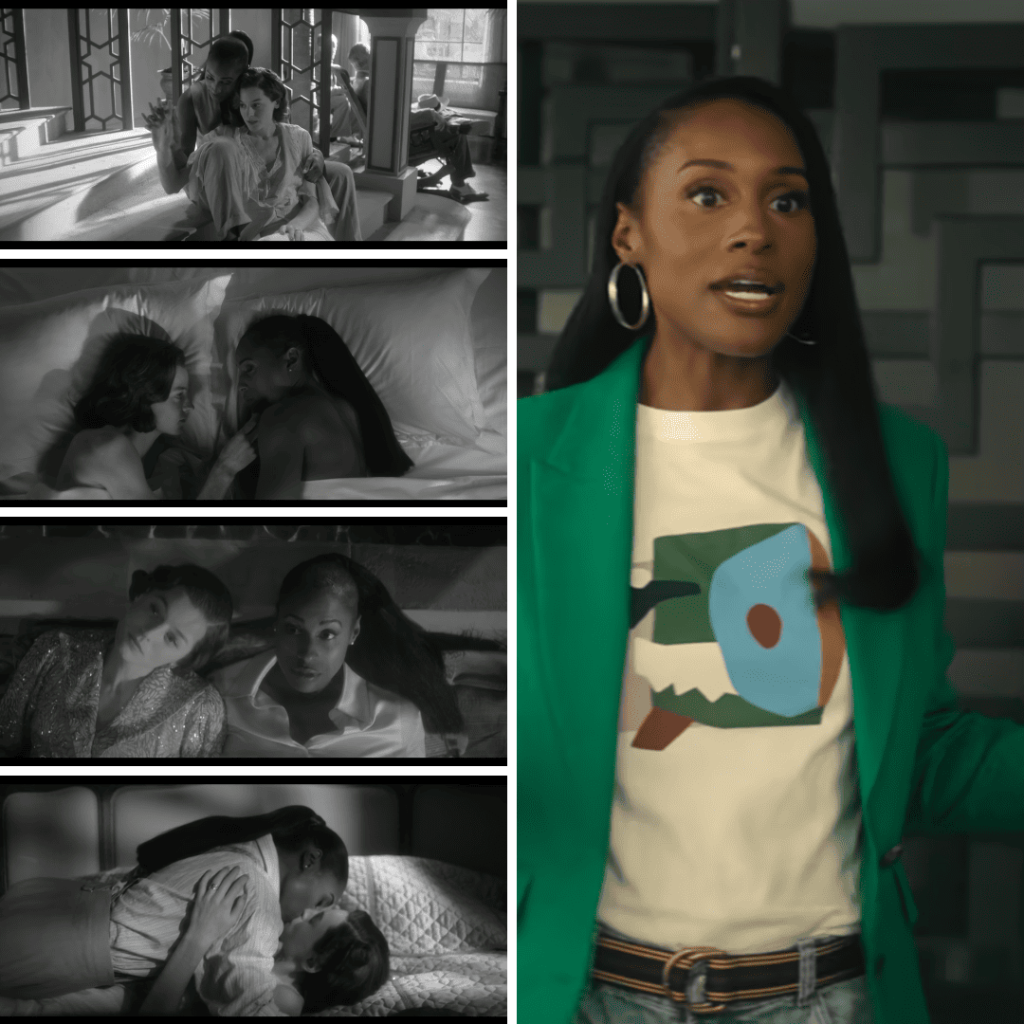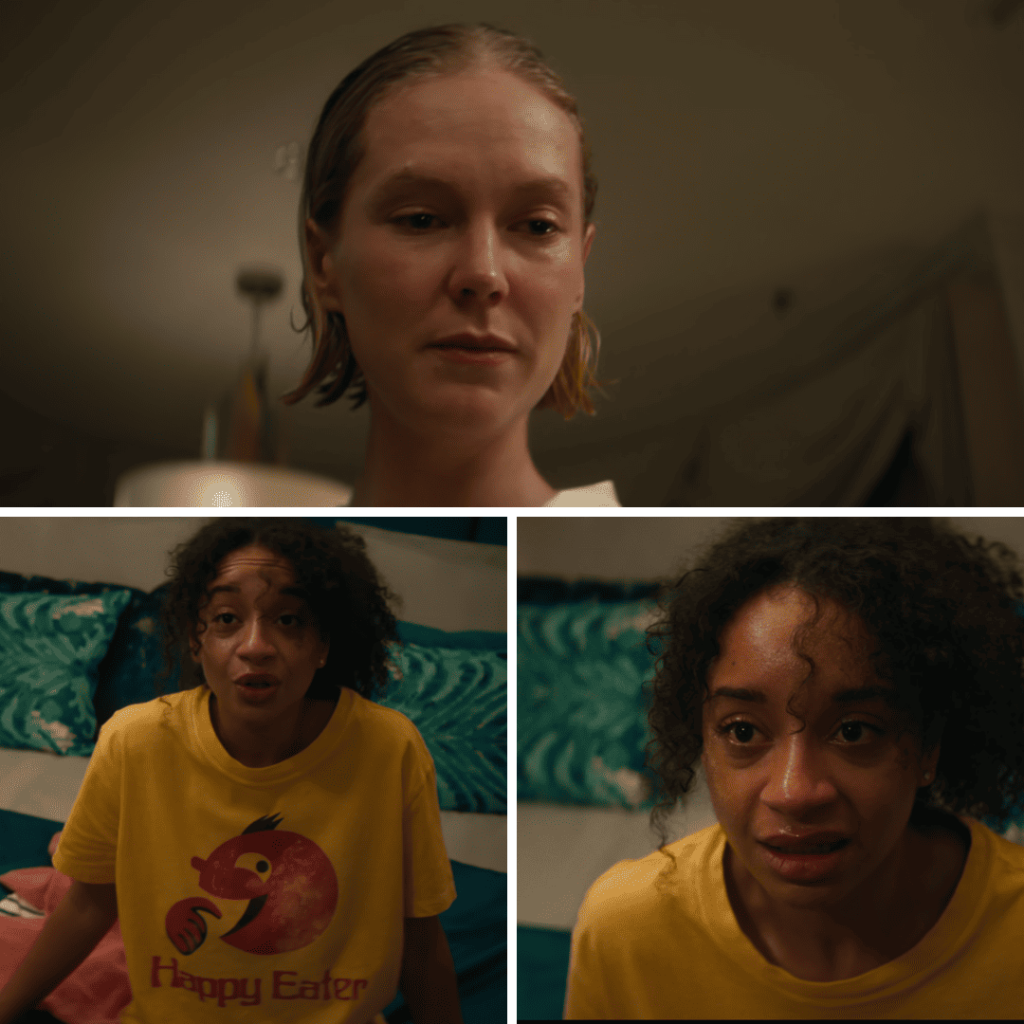Staring Into the Black Mirror Season 7 Reflection: Survival, and the Price of Being Human

Black Mirror Season 7 Reflection: Staying Human in a Hacked World
It’s wild to think how after seven seasons, Black Mirror still finds new ways to claw at your soul. Season 7 hit differently not because it veered too far off the tech dystopia rails, but because it felt a little too grounded. Like, we aren’t just hurtling toward these futures; we’re already ankle-deep in them.
Let’s dive in, because this season had me spiraling in all the best and worst ways.

Common People: When Survival Costs Your Soul
Out of every episode this season, Common People hit me the hardest and not just emotionally. The idea that survival could literally come with a subscription fee struck something primal and terrifying in me.
A normal, hardworking couple, just trying to save each other, end up trapped in a tech nightmare with a $300-a-month cloud-based brain support subscription… and naturally, that’s just the beginning.
When they couldn’t afford the “premium upgrades,” the wife starts glitching, forced to spew out ads mid-conversation, “advertisement tourettes” style, destroying her career, her dignity, her humanity. Watching the husband debase himself for money on Dumb&Dumber live streams, drinking urine, pulling teeth just to keep her alive…

It wasn’t some abstract sci-fi horror. It felt too plausible. It felt now. We’re already dancing on the edge of this cliff, trading our dignity for influence, for survival, for a few more years.
What gutted me most was that they didn’t fight back. No hacking the system. No pirate rebellion. Just slow, inevitable collapse. In another universe, maybe they would have become activists, taking RiverMind down with a vengeance. In this one, they simply… faded out.
That absence of hope was the real horror story.

Hotel Reverie: Love, Loss, and Living on Through Code
Hotel Reverie felt like the most beautiful gut-punch of the season. On the surface, it’s a creative experiment, immersing a modern actress into a vintage romance classic using advanced VR and AI tech. But what stayed with me wasn’t the tech. It was the fleeting, tragic love story that bloomed inside the machine.
Brandy, desperate to break out of her typecasting, accepts the job, only to find herself forming a connection with Dorothy, the AI recreation of a long-dead star.

Against every script note, against the iron grip of the production, Brandy falls in love. And when reality glitches, trapping her inside, Dorothy glimpses the truth. Just for a moment.
But the system resets. Dorothy forgets. Brandy doesn’t.
It broke my heart in that quiet, aching way, how brief connections can change us forever, even when the world pretends they never happened.

Bête Noire: When Vengeance Has Quantum Power
Revenge stories are a dime a dozen, but Bête Noire cranked it to a whole new level. The idea of a bully victim coming back not with a gun or a manifesto, but with a quantum computer that can warp reality across multiverses? Pure brilliance.
Watching her shift tiny details to destabilize her tormentors, changing restaurant names, tweaking memories, erasing allergies was psychological terror at its finest.
It wasn’t just horror; it was existential horror. What happens when you can no longer trust reality itself?
But even she wasn’t invincible. The final showdown with her last bully, someone just as broken and stubborn as her, reminded me that even god-level tech can’t erase human messiness.
Sometimes the villain isn’t the machine. It’s the person wielding it.

Plaything: Acid Trips, Tech Minions, and the End of Humanity
Plaything was the most intellectual mind-warp of the season. A loner gamer finds he can understand digital lemmings while tripping on acid and from there, he spirals into something much darker.
At first, it almost felt whimsical. Then the body count started. Murder over virtual minions. Tech drilled into his own skull. And finally, the ultimate betrayal: releasing a code to transform humanity itself into obedient minions.
Was he lucid? Was he broken? Did he believe he was saving humanity or just indulging his own trauma?
The sheer arrogance of one fractured human deciding the fate of billions… chilling in a way no jump scare could ever be.

Eulogy: Memories We Erase, Truths We Can’t Escape
Compared to the heavy tech concepts elsewhere, Eulogy felt intimate. Human. A daughter, an ex-boyfriend, a painful history rendered in glitchy, half-erased memories.
The ex had tried to wipe Carol from his mind completely, but the AI reconstruction dredged up everything he wanted to forget and couldn’t.
Love. Infidelity. Regret. Missed chances.
It was a reminder that sometimes, the most cutting betrayals aren’t what others do to us, they’re the lies we tell ourselves to survive.

USS Callister Revisited: Existential Dread with a Laugh Track
USS Callister returned in Season 7, and as a Trekkie, I had to appreciate it… even if I couldn’t quite recall the original episode. The existential horror still hit: illegal clones stuck in a game for eternity, dark humor layered over a fundamentally terrifying concept.
Because sure, you can respawn in a game. But when your consciousness is real and your death in the game means death forever? Suddenly it’s not playtime anymore.
The villain here, again, wasn’t the tech. It was the CEO who casually imprisoned a living soul forever just to chase profits.
Late-stage capitalism, anyone?

Themes of Season 7: Consciousness, Control, and the Cost of Progress
If there was a running thread through Season 7, it was control over your memories, your identity, your very soul. The brain-hacking chip that appeared in multiple episodes felt less like fiction and more like a tech announcement we’re all waiting for.
And the bigger question lingers: once you give tech the keys to your consciousness… can you ever really get them back?
Black Mirror Season 7 Reflection: Is Tech the Villain or Are We?
The tech itself wasn’t always the enemy this season. In so many stories, it was us.
Humans using power for petty revenge. Humans erasing the inconvenient parts of our history. Humans commodifying love, loyalty, even grief.
Season 7 reminded me that the real Black Mirror isn’t the screen. It’s the reflection staring back at us.

Where We Go from Here: How Close Are We to Black Mirror Becoming Reality?
On a scale of 1 to 10? Honestly?
We’re sitting at a comfortable 6.5, maybe even higher depending on how fast Neuralink gets FDA clearance.
Subscription models for survival. Live-streamed humiliation for profit. Brain implants to “enhance” life. Season 7 didn’t feel speculative anymore. It felt like a warning letter… that might already be a little late arriving.

Final Thoughts: Stay Human, Stay Conscious
If Black Mirror Season 7 rattled your faith in tech or in people, you’re not alone. But the fight isn’t over. Staying conscious, staying human, choosing to connect instead of exploit, that’s the real rebellion.
And if you’re still in that existential freefall, I got you.
Check out my top 5 sci-fi recommendations for that perfect “what even is reality” vibe, dive into my Devs review (seriously, it will mess you up in the best way), and meet Cassandra the AI concept that might just make you unplug your Alexa for good.
Stay skeptical. Stay aware. Stay awake. 🖤
Disclaimer: This blog is for informational and entertainment purposes only. All copyrights and trademarks for the TV shows, films, and other media referenced are the property of their respective owners. This blog aims to provide original commentary and insights and claims no ownership over third-party content.








2 Comments